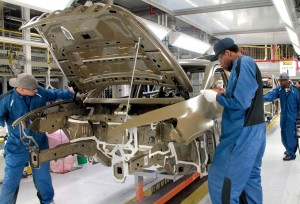The clock is rapidly ticking away towards an 11:59 PM deadline that could see Fiat Chrysler face its first strike in years. The United Autoworkers Union set the walkout threat after its members voted down their original contract offer and talks aimed at sweetening the deal appeared to stall.
The vote was an embarrassment for UAW leaders, especially new President Dennis Williams, who is leading contract talks with Detroit’s Big Three for the first time. He had originally set a cooperative tone, insisting a strike would be a “failure,” but he also stressed that he would not shy away from a confrontation, if that’s what it would take.
Here are some of the key reasons why the UAW may be ready to strike – and why FCA might be willing to risk a confrontation that industry analysts warn could cost it as much as $1 billion a week in lost revenue.
- A major sticking point for workers is the two-tier wage structure created in 2007 to reduce costs. FCA was willing to sweeten, but not eliminate, the system which has some new hires making little more than hamburger flippers in cities like NY that have raised minimum wages;
- Workers also are concerned about changes planned to what has been described as the gold standard of health care programs. The fear is that co-pays and other costs will soar;
- Workers were upset that the contract would have permitted some production to shift from the U.S. to Mexico, even though other products would come back to the U.S.
- They were also upset about the handling of jobs and production at the critical Jeep plant in Toledo, Ohio that may be the first hit by a strike tonight; and
- A sleeper issue concerns intense schedules that have many working 10-hour night shifts for four days then switching almost immediately to four more on the day shift.
The nearly two-to-one “no” vote on the contract also appears to have reflected rank-and-file frustration with President Williams and the rest of the UAW leadership. They’ve admitted not doing enough to sell the contract, and Williams has promised more “transparency” during the ongoing negotiations.
(UAW likely to strike first at profitable Jeep plants. Click Here for more.)
As for Fiat Chrysler, the maker hasn’t forgotten the bankruptcy that nearly scuttled the U.S. side of the company. FCA is still considered the weakest of the Detroit-based Big Three, despite having at least a $3 an hour labor cost advantage over Ford and General Motors. In part, that’s because it also has more new employees assigned to the second tier than those rivals.
FCA needs cash, and plenty of it, to help fund aggressive product plans for its many brands, including Jeep, Chrysler, Fiat and Alfa Romeo. It has also been slow to develop the electrified powertrains that will be needed to meet future emissions and mileage rules.
To raise an estimated $1 billion, FCA is set to launch an initial public offering of its ultra-exclusive Ferrari brand. It doesn’t want to have to hand that cash to its workers.
But both sides could lose out if there isn’t a settlement. Sean McAlinden, a senior analyst with the Center for Automotive Research, in Ann Arbor, Michigan, estimates a company-wide strike could cost FCA as much as $1 billion in revenues weekly, and take a $40 million hit on the bottom line.
(What was in the original FCA contract offer? Click Here to find out.)
UAW workers will take a big risk, as well. They’ll not even get strike pay – a modest $200 a week – unless and until they’re off the job for a second week.
Williams and his team also realize that at a time when Americans are less enthralled with unions then in decades, a noisy confrontation, especially one that cripples a major U.S. manufacturer, won’t earn much support. Meanwhile, a strike could make it all the more difficult to convince workers at the numerous non-union plants that dot the South that organizing would improve their lives.


There certainly is a means to reach a fair contract if both sides are willing to do so. A double pay standard and other unreasonable conditions such as 12 hour work days without OT, mandatory arbitrary changes in shift work hours, etc. being imposed on workers with virtually no impositions for the auto companies, illustrates a bad situation for labor in the U.S. where exploitation has increased dramatically since the world wide economic meltdown began circa 2008. It could end in tears for both sides if management is unreasonable and unrealistic after enjoying huge financial concessions in recent years for a badly mismanaged company on the brink of extinction were it not for U.S. tax payers providing a loan.